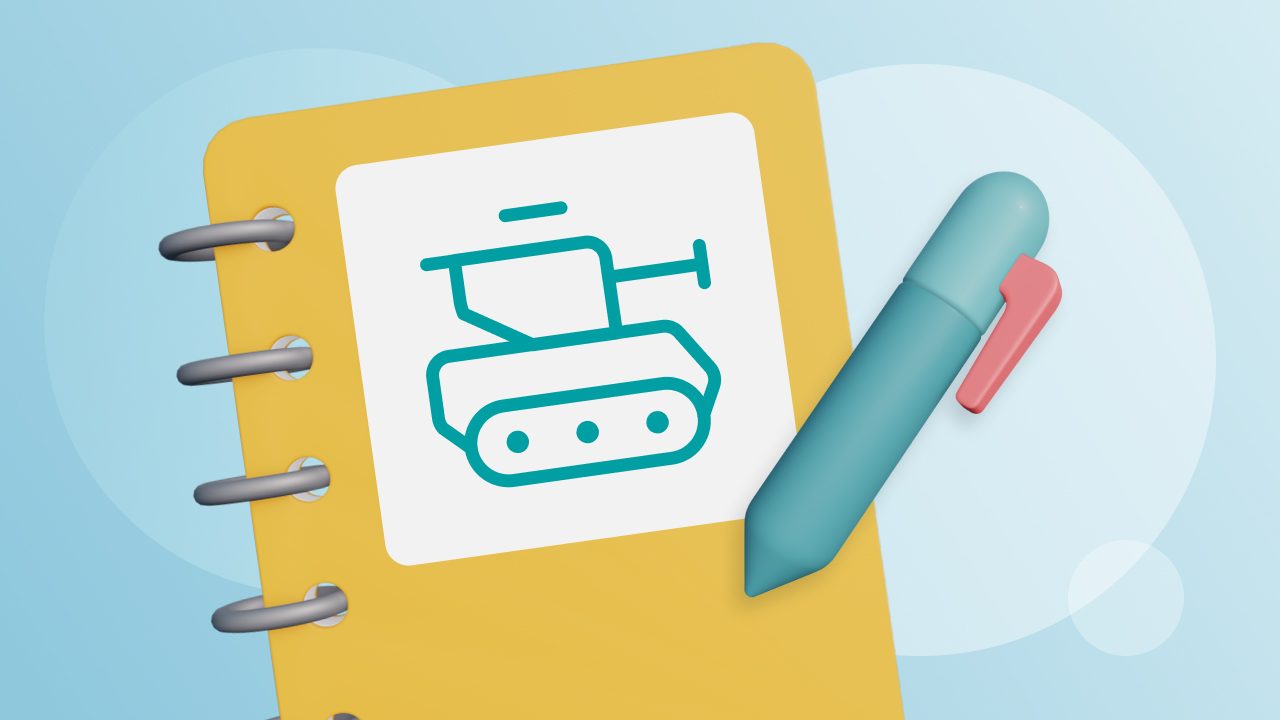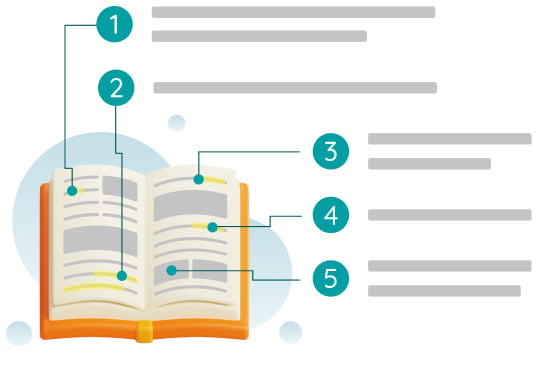In this guide, I will go through what a Research Study Report actually is and also some tips and tricks for answering one with top marks.
How to get a H1 in your Leaving Certificate History RSR Project
 By Jamie Dockery - 10 minute read
By Jamie Dockery - 10 minute readJamie has been teaching history and correcting state exams for over thirteen years. In this guide, he gives his tips on getting a H1 in the Leaving Cert History Research Study Report (RSR).

Jump to:
Introduction

Common questions
Before we start looking at what is involved in the report, I'm going to go through some common questions you may come across:
What is the RSR?
The Research Study Report (or the 'RSR' if you’re cool) is a project in which you carry out a piece of research on a topic of your choice. It is completed in a special booklet which is usually submitted in March/April, prior to the actual Leaving Certificate History exam.
Why is the RSR important?
Your RSR is super important because it’s worth a massive 20% of your total history result. Here’s some good news though: the average score for the RSR project is 90% so this is the perfect opportunity to get your history exam off to a great start. When you also consider that the 'documents-based question' in the exam is also 20%, you could have the subject nearly passed before you tackle any of those tricky essay questions.
How do I come up with my topic?
If I could offer you one piece of advice in terms of choosing your research topic, it would be this: pick something you’re interested in. You’re into sports? Music? Great, go with it. The wonderful thing about the RSR is that you really do have loads of choices. You’re going to be spending a LOT of time researching, thinking and writing about your chosen topic, so make sure it’s something you’re actually passionate about.
Maybe there’s someone famous from your local community or a particular event from history that you want to know more about. Maybe your teacher or a family member mentioned something that grabbed your attention. The only restrictions are that you need to be able to argue for your topic’s historical importance (more of that in the outline plan later) and that it happened before 1993 in Ireland and 1992 in Europe and the rest of the world.
Be original and creative. Lots of students each year pick topics around Adolf Hitler and the Concentration Camps for example. If your examiner can read something new and different, they might be more generous with their marks.
Research
Where do I get my information from?
Surprise, surprise, your first step will be to use the internet in order to familiarise yourself with your research topic. When looking up your topic on a search engine, try to be as detailed and specific as possible to ensure you get the right results. Using a website like Wikipedia is good for getting to know your topic but should not be relied on or mentioned in any part of your project. Instead, look for websites from third-level institutions, historical journals or reputable newspapers or magazines for your research.
What about my local library?
Your local library is a brilliant resource. I always advise my students to try and find a book from a historian on your topic and your library is the perfect place to look. Some libraries even have newspaper records and access to academic journals on their computer system which can be incredibly useful depending on your topic.
Don’t be afraid to approach the desk and tell the librarian what you are looking for. In my experience, librarians are really friendly and eager to help. It would be well worth the visit. You can check to see what books are available and can order them from any library in the country using: https://www.librariesireland.ie/
What if my topic is on local or family history?
Well, your library is definitely the place to look. As well as this, most counties have a historical society with people who have excellent local knowledge and are easy to find online. A sit-down chat or email correspondence could provide you with loads of information on your topic or give you ideas for other sources or further research. Local bookshops often have books published by historians from the area. An elderly family member might also be of help here.
When looking for sources to use in your research, the more the better. When it comes to using them in your report, you will be focusing on three. My top tip here is to pick:
- one primary source (if you can). Did someone involved in the event write a biography? Can you interview someone who witnessed an event?
- One book written by a historian on the topic.
- One reliable internet source.

Layout of your RSR booklet
Congratulations, you are now a historian! As you are reading through your material, make sure to take loads of notes and keep them in a folder or notebook. This will make things much easier when it comes to the hard part, putting your research down on the page.
Let’s look at the breakdown of the RSR booklet. We can split it into 5 parts:
Title of the study
The outline plan
Evaluation of sources
The extended essay
Review
Title of the study
This relates to what you have researched and what you will be writing about. Your title should be specific, detailed and include some date parameters.

The outline plan
The outline plan is worth 15 marks. Think of it as the introduction to your research. It should be broken up into four different parts:
Definition and justification
This is worth 3 marks. This is where you explain what it is you are researching and why your topic is historically significant.
Aims
This is worth 3 marks. This is where you explain what it is you are researching and why your topic is historically significant.
Intended approach
This is worth 3 marks. Write in the future tense and explain three ways that you will go about finding this information. For example, “I will interview a local historian, I will go to my local library, etc.”. You can also mention here how you will take and organise your notes and how you will draft and redraft your essay. It would also be a nice idea here to mention how you will ask your teacher for advice.
Sources
This is worth 6 marks. The last part of your outline plan is where you write out three of your sources in full detail (see my top tip above). It’s really important that you give every little detail regarding the source you used. For example, for a book, give the title, author, publisher and year published. If using a website, make sure to list the website’s address in full (with all the slashes, dashes and dots) as well as the date you accessed the site. Otherwise, I’m afraid easy marks will be lost (sad face).

Evaluation of sources
This part is worth 25 marks and is arguably the toughest part of the whole RSR. This is where you take the three sources you mentioned in the outline plan and discuss their value in detail (eVALUate? Get it?). Outline the relevance of the source to your chosen topic as well as its strengths and weaknesses as a historical source. In other words, explain what was useful and maybe not so useful about each of the three sources. Consider things like:
- whether your source is a primary or secondary one;
- who wrote/created your source? Are they trustworthy, or is there any evidence of bias?
- Did it cover exactly what you were looking for, or did it cover only a small aspect of your whole topic?
- How was your source structured? Was it easy to find information thanks to a contents page or index list?
- Did your sources contain any maps, photographs, images or statistics that were particularly useful?
- Did one of your sources contradict or give a different version of events from another source?
Details are key. Give specific details such as quotes or references to particular images to prove to the examiner that you actually studied the source and didn’t just flick through it.

The extended essay
The extended essay is worth 50 marks. You’ll probably spend more time drafting and redrafting your extended essay than any other part of the booklet (but remember, all the other bits and pieces are worth the same amount of marks). This is essentially where you lay out your research. In terms of word count, higher-level students should aim to write between 1,200 to 1,500 words with ordinary-level students aiming for 600 to 800 words. Don’t worry, there is plenty of space in the booklet and you don’t have to fill it. Here are some things to bear in mind when putting your essay together:
A brief opening
A brief opening is certainly important, it gives the background and context to your topic. Do try to make it attention-grabbing. Your examiner will have lots of RSRs to read each day so yours needs to stand out.
Quote and reference
Make sure to quote from and make reference to your sources throughout. You can use more than the three named at the start. This will show the examiner you have developed your historical research skills. Reference any source that you’ve used either at the bottom of each page or at the end of your essay.
Aims
It is super important that you achieve the three aims that you set out in your outline plan. Whatever it was that you said you wanted to find out, ensure you have covered them in the essay.
Strong conclusion
Make sure your essay has a strong conclusion in which you emphasise the historical significance or consequences of your topic. A memorable quote from a named historian would be great here too.
The marks for the extended essay are broken down like this:
Give your essays lots of detail to make sure you get high marks here.
Use your sources throughout the whole essay and quote from them. There’s no problem if your sources contradict each other, just explain that in your essay and try to draw your own conclusions.
Make sure your spelling and grammar are spot on here (your teacher can help you with this) and that your essay has a clear beginning, middle and end. Follow the timeline of your topic to make this easier.

Review
Well done, you’re nearly there. The review is worth 10 marks and this is the last step of your RSR. Here, you will write a page in which you reflect on the process of completing the research. Here are some things you could consider writing about:
- How did you decide on your chosen topic? Was it an easy decision or did you change your mind a lot? Why was that?
- Did you find it difficult to locate sources for your topic? How did you overcome this difficulty?
- Was there anything you learned about your topic that shocked or surprised you?
- Is there anything you would do differently if you could start again?
- Is there anything you came across while researching your topic that you would like to learn more about?
- What historical skills did you develop throughout your work completing the RSR project?
As mentioned earlier, your examiner will read many reviews and they can often be generic and 'samey'. Make yours stand out by giving lots of specific details and this will help you get full marks in this section.

Checklist
I hope this guide is helpful and that you find completing the research study report an enjoyable and rewarding experience. When you’re finished, use the checklist below to give yourself the best chance possible of getting the maximum marks in this section.

Jamie has multiple degrees and qualifications under his belt, including a bachelor's degree in Liberal Arts with English and History, and master's degrees in Modern English Literature, and also Leadership & Management in Education. Jamie has corrected at both Junior and Leaving Certificate levels since 2010. When not shaping young minds, he surfs and plays golf (badly and without grace!)

